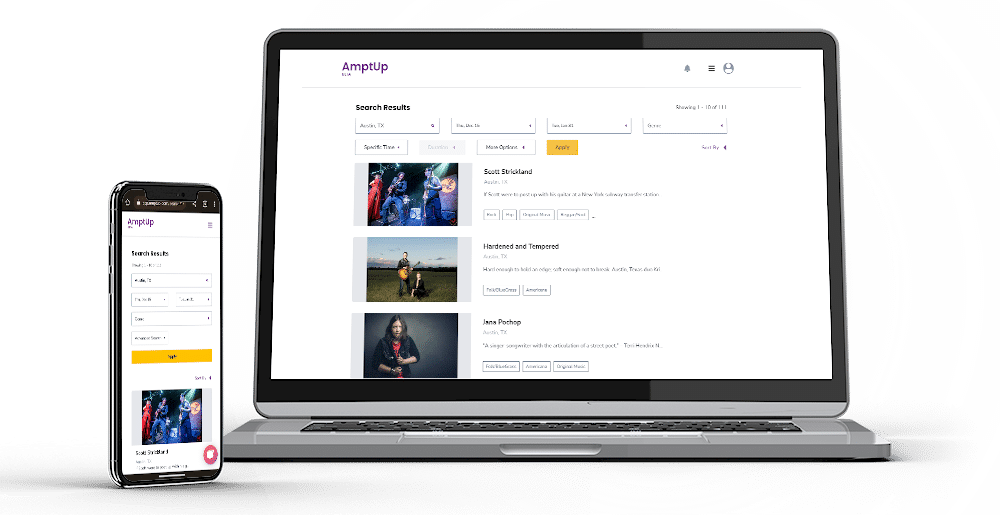AMP IT UP: A screenshot of AmptUp, a new booking app for venues.
Founders say App offers ‘full view of what a gig looks like’
Holly Hagerman and Frédéric Rouault believe in the power of independent live music.
The two co-founded Portland, Oregon-based AmptUp, a booking app for venues that they say simplifies and streamlines the process. It also increases transparency, and improves communication and operational efficiency throughout the “live music ecosystem,” said Hagerman, who is married to Rouault.
“Our tool basically takes the most time-consuming part of it, which is the booking process and going back and forth with musicians,” she said. “Currently, it takes about three weeks and probably 15 emails back and forth to book each band. We brought that down to about 3 minutes and three clicks. It’s a pretty dramatic time saver.”
With AmptUp, venues can track the status of a booking in real-time, receive artist assets at the time of booking, and calculate payouts. Meanwhile, musicians have centralized access to details to ensure they arrive on time and with all the right equipment — booking confirmations, tech setup information, house rules, and even the marketing and hospitality offers from the venue.
It works like this: The venue creates a profile, with details about its amenities, specs and tech riders. All that flows automatically into an offer. Venue officials just need to add the dates, times and payment structure for that musician, with any personalized comments.
“We found venues were answering the same questions over and over and over again,” she said. “This basically does the job for them. Musicians are, for the first time, getting a full view of what that gig looks like.
“For the vast majority of musicians, who are unrepresented, who don’t have agents, this is very rare. It tells them everything: Are they going to be fed? Are they going to have drinks? Where do they load in? What time? It just makes it easier for them and empowers them in their career to have a lot more transparency.”

Holly Hagerman
When musicians respond to the offer, they can make changes, decline it or accept it. When they accept it, they are asked to submit their marketing assets, including bio, social media links and tech rider.
“Venues, for the first time, don’t have to go chasing for everything,” she said. “They don’t have to be chasing for W9s and marketing photos. It makes it just a heck of a lot faster for them.”
From the prelaunch waitlist to the end of the first month, the list has grown quickly and organically, they say. The Boom Boom Room in San Francisco is among those to subscribe already.
AmptUp enters the fray as a new player in a space with a few already-established players, including Prism.fm, which focused on the promoter side, and Eventric Master Tour, a mainstay tool for tour managers and venues, and Artist Growth, which includes financial and business management software.
Hagerman says AmptUp is the lowest-cost booking tool available at less than $100 per month. A subscription is required for each venue. However, it may add as many stages or team members as it likes via that one subscription. AmptUp is a web-based application and is mobile responsive via internet browser. An app is forthcoming.
“We started with a desktop website because our research found that the vast majority of venues may answer quick musician questions on the go, but they generally sit down for a chunk of time to work on booking,” she said.
Hagerman’s original plan was to build a pay-by-the-hour brick-and-mortar rehearsal space, concert hall and cafe with her musician husband. But, in 2020, she had the epiphany that led to AmptUp.
“AmptUp was started just really out of the need watching all of our friends who were musicians lose their livelihood overnight — just kind of go ‘poof’ — with the pandemic,” she said.
“I thought, ‘Why is it so hard to find a musician?’ So, we started creating a marketplace that also had this incredible tour-routing tool. Our focus is on venues and supporting small, independent venues because they were sort of the forgotten child, I think, of the pandemic.”
Hagerman said the Save Our Stages Act, which helped secure $16 billion in federal aid for independent music, focused more on musicians than venues. She and Rouault strive to support the return of indie venues, with the goal to make every city a “music town.”
“We had friends from around Portland who packed up and moved to LA” to pursue music, she said.
“Portland wasn’t considered a music town. We were very sad. We also had a couple of French friends — my husband is French — who lived in Portland and struggled here. Oftentimes, they would get to a gig and they wouldn’t really know how much they were getting paid or what was fully agreed upon.
“Then, they wouldn’t have enough money for gas on the way home. That was a big part of the inspiration behind this. We’re supporting local musicians and making sure that they can make a living where they are — and that’s so great.”







